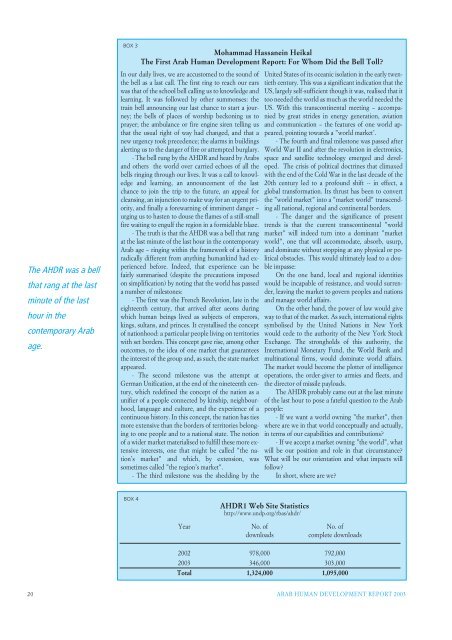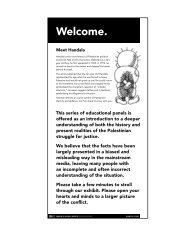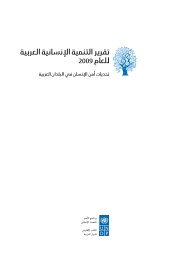BOX 2How Do Arabs Feel About the Three Deficits?A large-scale international study (World Values Survey) presents an opportunityto compare Arab attitudes towards knowledge, good governanceand gender equality with those expressed in other regions.The following results are based on field surveys in a large numberof countries throughout the world, including four Arab countries(Algeria, Egypt, Jordan, and Morocco) that comprise about half theArab people.In addition to the Arab region, the surveys provide enough data tocompare the Arab region to eight other country groupings: other (non-Arab) Islamic countries, sub-Saharan Africa, Eastern Europe, SouthAsia, USA/ Canada, Australia and New Zealand, Latin America, EastAsia, and Western Europe.According to this survey, Arabs value knowledge and good governancestrongly but take an ambivalent stand on gender equality.Among the nine regions, Arabs expressed the highest preferencefor the role of science in the service of <strong>human</strong>ity. Arabs also topped thelist of those supporting the statement that "democracy is better thanany other form of government" and expressed the highest level of rejectionof authoritarian rule (a strong leader who does not have tobother with parliament and elections).On the empowerment of women, the Arabs came third in rejectingthat "a university education is more important for a boy than for a girl"while expressing the highest approval that "when jobs are scarce, menshould have more right to a job than women". In other words, Arabsstood for gender equality in education but not in employment. In<strong>human</strong> <strong>development</strong> terms, Arabs expressed support for building the<strong>human</strong> capabilities of women but not for their utilisation.Evidently, Arab public opinion strongly supports the focus ofAHDR1 on the two deficits of freedom/good governance, and knowledge.But AHDR1 might have been ahead of Arab public opinion instressing women’s full empowerment in both education and employmentaccording to the paradigm of building <strong>human</strong> capabilities andutilising them effectively.Figure 1Democracy is the best form of governmentFigure 2Rejection of authoritarian ruleFigure 3Gender equality in higher educationFigure 4Gender equality in employmentSource of WVS data: Inglehart, R., Background Paper for AHDR2.PART I: CHANGES IN HUMAN DEVELOPMENT IN ARAB COUNTRIES DURING 2001-2002 19
The AHDR was a bellthat rang at the lastminute of the lasthour in thecontemporary Arabage.BOX 3Mohammad Hassanein HeikalThe First Arab Human Development Report: For Whom Did the Bell Toll?In our daily lives, we are accustomed to the sound ofthe bell as a last call. The first ring to reach our earswas that of the school bell calling us to knowledge andlearning. It was followed by other summonses: thetrain bell announcing our last chance to start a journey;the bells of places of worship beckoning us toprayer; the ambulance or fire engine siren telling usthat the usual right of way had changed, and that anew urgency took precedence; the alarms in buildingsalerting us to the danger of fire or attempted burglary.- The bell rung by the AHDR and heard by Arabsand others the world over carried echoes of all thebells ringing through our lives. It was a call to knowledgeand learning, an announcement of the lastchance to join the trip to the future, an appeal forcleansing, an injunction to make way for an urgent priority,and finally a forewarning of imminent danger –urging us to hasten to douse the flames of a still-smallfire waiting to engulf the region in a formidable blaze.- The truth is that the AHDR was a bell that rangat the last minute of the last hour in the contemporaryArab age – ringing within the framework of a historyradically different from anything <strong>human</strong>kind had experiencedbefore. Indeed, that experience can befairly summarised (despite the precautions imposedon simplification) by noting that the world has passeda number of milestones:- The first was the French Revolution, late in theeighteenth century, that arrived after aeons duringwhich <strong>human</strong> beings lived as subjects of emperors,kings, sultans, and princes. It crystallised the conceptof nationhood: a particular people living on territorieswith set borders. This concept gave rise, among otheroutcomes, to the idea of one market that guaranteesthe interest of the group and, as such, the state marketappeared.- The second milestone was the attempt atGerman Unification, at the end of the nineteenth century,which redefined the concept of the nation as aunifier of a people connected by kinship, neighbourhood,language and culture, and the experience of acontinuous history. In this concept, the nation has tiesmore extensive than the borders of territories belongingto one people and to a national state. The notionof a wider market materialised to fulfill these more extensiveinterests, one that might be called "the nation’smarket" and which, by extension, wassometimes called "the region’s market".- The third milestone was the shedding by theUnited States of its oceanic isolation in the early twentiethcentury. This was a significant indication that theUS, largely self-sufficient though it was, realised that ittoo needed the world as much as the world needed theUS. With this transcontinental meeting – accompaniedby great strides in energy generation, aviationand communication – the features of one world appeared,pointing towards a "world market’.- The fourth and final milestone was passed afterWorld War II and after the revolution in electronics,space and satellite technology emerged and developed.The crisis of political doctrines that climaxedwith the end of the Cold War in the last decade of the20th century led to a profound shift -- in effect, aglobal transformation. Its thrust has been to convertthe "world market" into a "market world" transcendingall national, regional and continental borders.- The danger and the significance of presenttrends is that the current transcontinental "worldmarket" will indeed turn into a dominant "marketworld", one that will accommodate, absorb, usurp,and dominate without stopping at any physical or politicalobstacles. This would ultimately lead to a doubleimpasse:On the one hand, local and regional identitieswould be incapable of resistance, and would surrender,leaving the market to govern peoples and nationsand manage world affairs.On the other hand, the power of law would giveway to that of the market. As such, international rightssymbolised by the United Nations in New Yorkwould cede to the authority of the New York StockExchange. The strongholds of this authority, theInternational Monetary Fund, the World Bank andmultinational firms, would dominate world affairs.The market would become the plotter of intelligenceoperations, the order-giver to armies and fleets, andthe director of missile payloads.The AHDR probably came out at the last minuteof the last hour to pose a fateful question to the Arabpeople:- If we want a world owning "the market", thenwhere are we in that world conceptually and actually,in terms of our capabilities and contributions?- If we accept a market owning "the world", whatwill be our position and role in that circumstance?What will be our orientation and what impacts willfollow?In short, where are we?BOX 4AHDR1 Web Site Statisticshttp://www.undp.org/rbas/ahdr/Year2002<strong>2003</strong>TotalNo. ofdownloads978,000346,0001,324,000No. ofcomplete downloads792,000303,0001,095,00020 ARAB HUMAN DEVELOPMENT REPORT <strong>2003</strong>
- Page 2 and 3: United Nations Development Programm
- Page 5 and 6: Immersion, yes, but swamped or drow
- Page 7 and 8: level of development, help all its
- Page 9 and 10: interrelated issues in some depth.
- Page 11: ABBREVIATIONS AND ACRONYMSAFTAAHDIA
- Page 14 and 15: The Arab knowledge civilisation: so
- Page 16 and 17: Cultural interaction129CHAPTER 7SOC
- Page 18 and 19: 7.1 Patriarchal Society in Arab Cou
- Page 20 and 21: EXECUTIVE SUMMARYThe first Arab Hum
- Page 22 and 23: nowadays can provide the means to e
- Page 24 and 25: presence of significant human capit
- Page 26 and 27: movements with an Islamic mark unde
- Page 29 and 30: Arab citizens areincreasingly pushe
- Page 31 and 32: Constitutions, lawsand administrati
- Page 33 and 34: PART IChanges in human development
- Page 35: The challenge ofbuilding humandevel
- Page 39 and 40: Governments, statingconsiderations
- Page 41 and 42: BOX 6Human Rights Watch Report 2002
- Page 43 and 44: Occupation posed toIraqis a new cha
- Page 45 and 46: Arab countries, onaverage, continue
- Page 47 and 48: In most Arab countriesthe march of
- Page 49 and 50: The core challenges tohuman develop
- Page 51 and 52: CHAPTER 1Conceptual framework: know
- Page 53 and 54: level of society, between knowledge
- Page 55 and 56: it. As such, the returns to knowled
- Page 57 and 58: knowledge vary and interact, especi
- Page 59 and 60: of calculation systems and the util
- Page 61 and 62: BOX 1.5Ahmad Kamal Aboulmagd: Towar
- Page 63 and 64: Figure 1.4PC availability and Inter
- Page 65 and 66: PART IISection two: the state of kn
- Page 67 and 68: The most seriousproblem facing Arab
- Page 69 and 70: Communication ineducation is didact
- Page 71 and 72: One of the mainfeatures of manyuniv
- Page 73 and 74: The evaluation indicates that priva
- Page 75 and 76: Official Arab satellitechannels dom
- Page 77 and 78: The harassment ofthe press under th
- Page 79 and 80: Figure 2.7Personal computers: Arab
- Page 81 and 82: There is clearly alarger role for t
- Page 83 and 84: ooks for translation in order to fu
- Page 85 and 86: Arabic research activitycontinues t
- Page 87 and 88:
Workers in scientific research andd
- Page 89 and 90:
TABLE 3.3Number of scientific resea
- Page 91 and 92:
Restricting intellectualfreedom is
- Page 93 and 94:
Figure 3.3Number of publications -
- Page 95 and 96:
when economic crises and security c
- Page 97 and 98:
The main threat to freeliterature a
- Page 99 and 100:
CHAPTER 4Measuring knowledge capita
- Page 101 and 102:
noted, the current attempt to measu
- Page 103 and 104:
esearch and development and arts pr
- Page 105 and 106:
velopment. Does the disparity in hu
- Page 107 and 108:
ple)7. Book titles (per million peo
- Page 109 and 110:
Despite the methodological and othe
- Page 111 and 112:
Figure 5.1:Actors and linkages in t
- Page 113 and 114:
Industrial R&Dinstitutions are weak
- Page 115 and 116:
Until Arab countriesdevelop andseam
- Page 117 and 118:
Governments havelarge responsibilit
- Page 119 and 120:
sibilities of information and commu
- Page 121 and 122:
Joint Euro-Arab R&Dactivities in th
- Page 123 and 124:
PART IISection three: the cultural,
- Page 125 and 126:
The issue of Arabintellectual herit
- Page 127 and 128:
The Arab mentality (is)a system tha
- Page 129 and 130:
Heritage has been adynamic contribu
- Page 131 and 132:
BOX 6.3Al Kawakibi (1854-1902) Desp
- Page 133 and 134:
The Arabic language isthe distincti
- Page 135 and 136:
BOX 6.8Arab North Africa - Language
- Page 137 and 138:
The re-birth of theArabic language
- Page 139 and 140:
Traditionaloccupations and craftsar
- Page 141 and 142:
Arab contemporaryculture is general
- Page 143 and 144:
CHAPTER 7Socio-economic structureTh
- Page 145 and 146:
tivities.The first consequence of t
- Page 147 and 148:
also narrowed markets. Yet it is wo
- Page 149 and 150:
The volume of Arab capital invested
- Page 151 and 152:
BOX 7.1Patriarchal Society in Arab
- Page 153 and 154:
amid the contraction of domestic ec
- Page 155 and 156:
knowledge societies in Arab countri
- Page 157 and 158:
The isolation ofcultural elites has
- Page 159 and 160:
The goal should be toinstitutionali
- Page 161 and 162:
BOX 8.3Imam Muhammad Abduh(1849-190
- Page 163 and 164:
Penalties meted out tojournalists,
- Page 165 and 166:
Disregard forintellectual propertyp
- Page 167 and 168:
Concerns that theworld economicsyst
- Page 169 and 170:
BOX 8.6Trade and Development: Prebi
- Page 171 and 172:
CHAPTER 9A strategic vision: the fi
- Page 173 and 174:
1. UNLEASHING ANDGUARANTEEING THE K
- Page 175 and 176:
certed efforts of the state, civil
- Page 177 and 178:
programmes of higher education inst
- Page 179 and 180:
also initiate innovation: it could
- Page 181 and 182:
BOX 9.4Imams (religious leaders) ad
- Page 183 and 184:
cially useful in the production of
- Page 185 and 186:
just one external point of referenc
- Page 187 and 188:
ReferencesEnglish ReferencesAmnesty
- Page 189 and 190:
Egyptian Sociology". National Centr
- Page 191 and 192:
Maalouf, Amin, 2001.In the Name of
- Page 193 and 194:
Fasl Al-Makal fi Taqrir ma bain Al-
- Page 195 and 196:
Clovis Maksoud, Introduction to the
- Page 197 and 198:
Elements of opinion survey of Arab
- Page 199 and 200:
Table A-1NET ENROLMENT RATIOS (%) I
- Page 201 and 202:
Table A-5PUPILS PER TEACHER RATIO B
- Page 203 and 204:
Table A-9RELATIVE DISTRIBUTION OF T
- Page 205 and 206:
198 ARAB HUMAN DEVELOPMENT REPORT 2
- Page 207 and 208:
Table A-10VALUES OF INDICATORS ON K
- Page 209 and 210:
202 ARAB HUMAN DEVELOPMENT REPORT 2
- Page 211 and 212:
204 ARAB HUMAN DEVELOPMENT REPORT 2
- Page 213 and 214:
206 ARAB HUMAN DEVELOPMENT REPORT 2
- Page 215 and 216:
208 ARAB HUMAN DEVELOPMENT REPORT 2
- Page 217:
Table A-13VALUES OF KNOWLEDGE OUTCO







